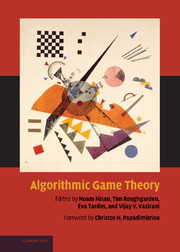Book contents
- Frontmatter
- Contents
- Foreword
- Preface
- Contributors
- I Computing in Games
- 1 Basic Solution Concepts and Computational Issues
- 2 The Complexity of Finding Nash Equilibria
- 3 Equilibrium Computation for Two-Player Games in Strategic and Extensive Form
- 4 Learning, Regret Minimization, and Equilibria
- 5 Combinatorial Algorithms for Market Equilibria
- 6 Computation of Market Equilibria by Convex Programming
- 7 Graphical Games
- 8 Cryptography and Game Theory
- II Algorithmic Mechanism Design
- III Quantifying the Inefficiency of Equilibria
- IV Additional Topics
- Index
1 - Basic Solution Concepts and Computational Issues
from I - Computing in Games
Published online by Cambridge University Press: 31 January 2011
- Frontmatter
- Contents
- Foreword
- Preface
- Contributors
- I Computing in Games
- 1 Basic Solution Concepts and Computational Issues
- 2 The Complexity of Finding Nash Equilibria
- 3 Equilibrium Computation for Two-Player Games in Strategic and Extensive Form
- 4 Learning, Regret Minimization, and Equilibria
- 5 Combinatorial Algorithms for Market Equilibria
- 6 Computation of Market Equilibria by Convex Programming
- 7 Graphical Games
- 8 Cryptography and Game Theory
- II Algorithmic Mechanism Design
- III Quantifying the Inefficiency of Equilibria
- IV Additional Topics
- Index
Summary
Abstract
We consider some classical games and show how they can arise in the context of the Internet. We also introduce some of the basic solution concepts of game theory for studying such games, and some computational issues that arise for these concepts.
Games, Old and New
The Foreword talks about the usefulness of game theory in situations arising on the Internet. We start the present chapter by giving some classical games and showing how they can arise in the context of the Internet. At first, we appeal to the reader's intuitive notion of a “game”; this notion is formally defined in Section 1.2. For a more in-depth discussion of game theory we refer the readers to books on game theory such as Fudenberg and Tirole (1991), Mas-Colell, Whinston, and Green (1995), or Osborne and Rubinstein (1994).
The Prisoner's Dilemma
Game theory aims to model situations in which multiple participants interact or affect each other's outcomes. We start by describing what is perhaps the most well-known and well-studied game.
Example 1.1 (Prisoners' dilemma) Two prisoners are on trial for a crime and each one faces a choice of confessing to the crime or remaining silent. If they both remain silent, the authorities will not be able to prove charges against them and they will both serve a short prison term, say 2 years, for minor offenses.
- Type
- Chapter
- Information
- Algorithmic Game Theory , pp. 3 - 28Publisher: Cambridge University PressPrint publication year: 2007
- 16
- Cited by

